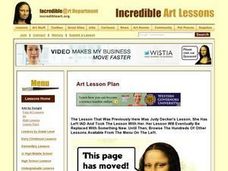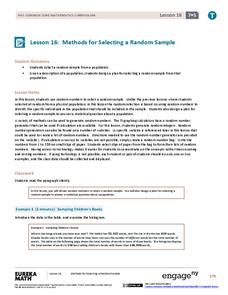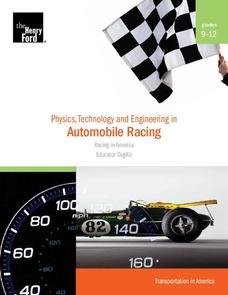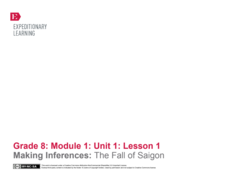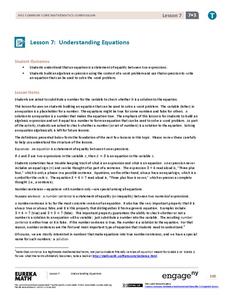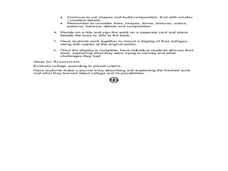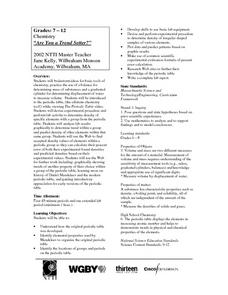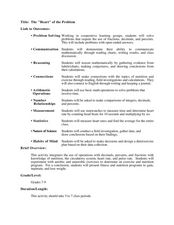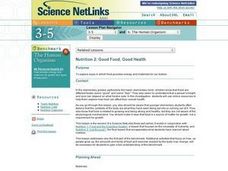Curated OER
Paper Maché Mancala Game Boards
Seventh graders create three dimensional works of art from two dimensional plans, develop skills in papier-mach?? technique, utilize elements and principles of design to create 3-D form, and develop math/strategy skills in playing the...
EngageNY
Methods for Selecting a Random Sample
Random sampling is as easy as choosing numbers. Teams use random numbers to create a sample of book lengths from a population of 150 books. The groups continue by developing a technique to create samples to compare from two populations...
Curated OER
Coil Vessels with Symbols
Eighth graders explore symbolism in Renaissance art, use ceramics vocabulary, and demonstrate craftsmanship in working with clay.
Henry Ford Museum
Physics, Technology and Engineering in Automobile Racing
Start your engines! This five-lesson unit introduces physics and Newton's laws through automobile racing. Each lesson includes background information, a student worksheet, and an answer key. There are also culminating...
PBS
Blow the Roof Off!
Blow the minds of young scientists with this collection of inquiry-based investigations. Based on a series of eight videos, these "hands-on, minds-on" science lessons engage young learners in exploring a wide range of topics...
EngageNY
Making Inferences: The Fall of Saigon
Get hooked! Reel in and hook scholars to the unit with a slide show, text-based activity, and reading exercises. To increase curiosity, learners read only small pieces of Panic Rises in Saigon, but the Exits Are Few. Readers use the...
California Education Partners
Covers by Nikki Giovanni
Over three days, scholars listen to and read the poem, "Covers" by Nikki Giovanni. Learners complete a graphic organizer by sketching their visualizations from each stanza then discuss their pictures with a peer. Pupils answer...
EngageNY
Building Background Knowledge and Making Inferences: What Is a Natural Disaster?
That's a disaster! Scholars complete a gallery walk to view images and make inferences about natural disasters. They fill out a note catcher about what they observe and infer any questions they may have. They then participate in a World...
EngageNY
Understanding Equations
After examining expressions in the first six lessons of the series, learners are now ready to apply those concepts to create equations in the seventh installment of 28. Each exercise contains a conceptual situation that helps build an...
University of Delaware
Constructing Text-Based Arguments About Social Issues
Eighth graders take a stand on a variety of controversial topics with a lesson on argumentative writing. As they view an informative presentation and work with collaborative groups, they decide which side of each argument they want to...
August House
The Stolen Smell
Some smells are better than others! Explore your sense of smell with a series of activities based on the Peruvian folktale, The Stolen Smell. With exercises about phonics, counting, cooking, art, and drama, the lesson is a...
Anti-Defamation League
10 Ideas for Teaching Black History Month
Celebrate Black History Month with the help of 10 ideas that delve deep into the history, major events, contributions, famous African Americans, and sheds light on how scholars today can take a proactive stance on current civil rights...
Curated OER
Outside...North of the 49th Parallel
Students explore and discuss images of Canadian landscape focusing on the work of the Group of Seven. The discuss different Canadian environments in a group of art works and complete a chart categorizing the depictions. They complete a...
Curated OER
Are You a Trend Setter?
Young scholars are introduced to the periodic table of elements. They devise and perform and experiment in which they determine the density of specific elements. They use their results to predict the density of other elements in the same...
Curated OER
Food Chain
Third graders explore why food chains are important. In this food chain lesson, 3rd graders break into small groups to represent parts of the food chain. Different amounts of food are given to each group and any spilled food will be...
Curated OER
Now Hear This!
Students create a model of the inner ear. In this hearing lesson, students follow a series of directions to build a working model of the inner ear, then observe how the parts react to a variety of sounds.
Curated OER
The "Heart" of the Problem
Students create an exercise and nutrition program. In this interdisciplinary activity, students use calculations of exercises plus their corresponding effects on the body and nutritional values of food to derive a health plan. Students...
Curated OER
Measuring Animal Sizes (and Relative Sizes in our Animal Environment)
Students discover the actual size and weight of many insects and animals. For this biology lesson, students investigate animals and insects to determine their actual weight and size. In groups, students create an animal or insect of...
Curated OER
Good Food, Good Health
Learners investigate how food provides energy for the human body. In this physical health lesson, students access online resources to identify how certain foods can affect their health. Learners discuss how many servings of each food...
Curated OER
I Did It!
Second graders choose a "positive work habit name" and explain why they choose the selected name. They share self-assessment information about their work habits and progress from week to week. Students respond with, "I did it" anytime...
Curated OER
Good Citizenship and Philanthropy
Students discuss how to work together to solve community problems. In this community problems lesson plan, students discuss how their home, school, and community could benefit from group work and philanthropy. They read different...
Curated OER
Fifth Grade Editing
In this language arts instructional activity, students demonstrate proofreading and editing skills by fixing the errors in 10 sentences. Students identify the capitalization, punctuation and grammar errors and rewrite each sentence...
Curated OER
Home Spelling Practice: Grade 6: Prefixes
In this spelling instructional activity, students learn to spell 20 words in a list. All words contain prefixes. Students write each word one time. There are additional at-home activities.
Curated OER
Helping Ourselves: Why Philanthropy Works
Young scholars discover the concept of philanthropy. In this civics activity, students investigate the role of philanthropy in our society, and how it makes life better for all.
